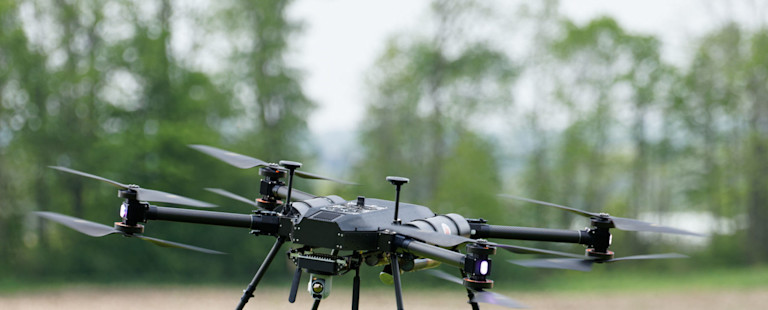Client Spotlight: Matt McRoberts, Co-Founder and CEO of Pegasus Aeronautics
Pegasus Aeronautics’s co-founders Matt McRoberts and Joe Kinsella turned a university design project into a game-changing technology that has quickly won praise and contracts across the autonomous aviation industry. The startup specializes in hybrid engine technology for UAVs, addressing critical industry challenges like energy capacity and UAV range associated with battery-powered drones. Under McRobert’s leadership, the company has expanded from developing power electronics to creating complete UAV platforms while maintaining a strong commitment to Canadian manufacturing and technological excellence.

Electrification is reshaping how people and products are moved, from cars and transport trucks to boats and unmanned aerial vehicles (UAVs). Electric vehicles (EVs) have the potential to reduce our carbon footprint, but much of the existing technology relies on fully-electric power systems. These systems are limited by a vehicle’s battery capacity, which many EV owners know all too well as the dreaded range anxiety.
Pegasus Aeronautics is solving this challenge with a hybrid power system for fixed-wing and rotor-powered UAVs. The company has won contracts with leading worldwide UAV manufacturers and recently announced its own drone platform, which is completely manufactured in Canada.
A class project lifts off
McRoberts said the company’s path follows the same arc as many Accelerator Centre clients. The founders met as students at the University of Waterloo and worked together on a fourth-year design project that the two realized had major market opportunities.
A few of their professors advised them that they had something that could be commercialized, and McRoberts said they decided to give it a try and launched the company in 2015.
“We looked at the industry at the time, and everything was focused on battery power. While batteries are fairly simple, there are a few big issues with their use. They're not very energy-dense, meaning that their energy storage is minimal relative to the weight of the batteries. There are also logistical difficulties, including having to recharge the batteries and transporting them to a work site. All these challenges hindered the effectiveness of UAVs in industrial uses,” McRoberts said.
Pegasus Aeronautics developed a technology that uses gas fuel to generate electricity, keeping UAVs airborne for longer flights and heavier payloads. After launching the company in 2015, the co-founders applied and were accepted into the Accelerator Centre’s Jumpstart program.
“That program was hugely beneficial for us. It was the first outside vote of confidence that allowed us to say that we're actually going to build this into a company,” McRoberts said.
From power units to a UAV platform
Pegasus Aeronautics spent the next few years honing its technology as it worked towards getting its power units ready for sale. It launched its first product in late 2019 and has quickly earned the trust of UAV manufacturers and operators across the world.
“We're a very under-the-radar UAV company, but almost every large UAV manufacturer is using our hybrid technology as the backbone of their hybrid strategies. Whether it’s defence or industrial applications, these manufacturers see hybrid as the future for their operations,” he said.
Range and payload capacity are critical for operations like long-range survey missions and material delivery flights. Pegasus Aeronautics’ hybrid power units solve this by using gas to generate electricity for the UAV’s motors. As more manufacturers adopted its technology, McRoberts said they started to receive inquiries for not only a power unit but an entire UAV platform.
“We started building our full UAV solution, not because it's something that we necessarily wanted to do, but because it's something that the market asked us for. We have been building engine technology which is probably the most complex component, both mechanically and electrically, on a UAV. Because we bit off the most difficult things early on, it allowed us to shift into building other components like motors and batteries,” McRoberts said.
Another advantage for Pegasus Aeronautics is that all its components are manufactured in Canada. McRoberts said there is increasing pressure for domestically-made UAVs in the US and Canada for defence and security operations.
“We stepped into that role by developing motors, actuators, and battery systems that are used on all UAVs because people wanted a North American-built solution. It wasn’t far to build a full UAV platform from there,” he said.
Having the Accelerator Centre as a wingman
Pegasus Aeronautics is part of the inaugural Aerospace Accelerator Program at the Accelerator Centre. McRoberts said the program is helping the company reach new heights and bringing attention to the rich aerospace ecosystem in the Waterloo Region.
“There’s so much infrastructure for aerospace companies here that even we weren’t completely tapped into. That’s something we want to improve moving forward. Not only as a mechanism to improve our capabilities from a testing perspective but also to figure out ways that we can start to support the local ecosystem as well,” McRoberts said.
One of the most significant aspects of the Aerospace Accelerator Program is the ability to leverage the Region of Waterloo International Airport and other areas of the community for testing.
“Locations and facilities where we can test are very important and Ontario is a perfect place for the UAV industry because the temperature range is so vast. Second to that, being part of the Aerospace Accelerator gives us third-party validation for our technology. Anyone can say, ‘We built the best UAV,’. Being part of the Aerospace Accelerator means we have people who can say, ‘These guys claim they can do this. We saw it. We can validate it.’,” McRoberts said.
Pegasus Aeronautics is focused on validating its technology on the Sentinel platform and has targeted commercial readiness in January 2025.
“We have a timeframe where we can say we've tested the platform and we can hit the ground running. We’re making sure that we’re ready for any opportunities in the future, and the Aerospace Accelerator Program is helping us do that,” McRoberts said.
Visit pegasusaero.ca to learn more about the UAV power innovations from Pegasus Aeronautics.